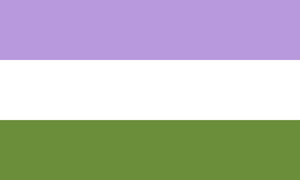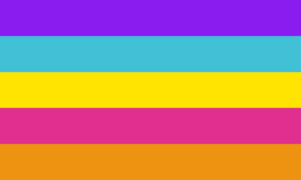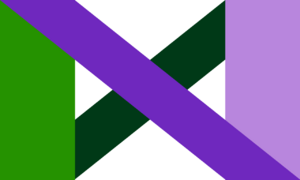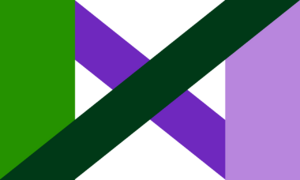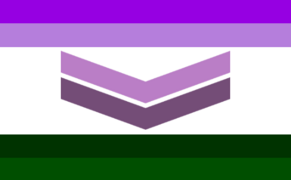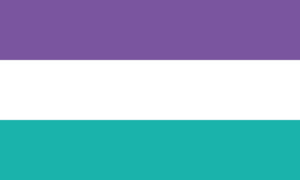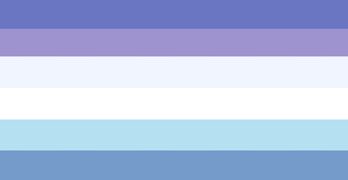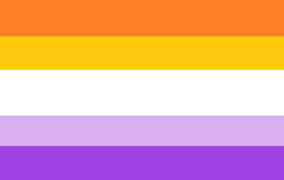Pride Gallery/Genderqueer: Difference between revisions
imported>TXJ No edit summary |
imported>PolarLime No edit summary |
||
| Line 7: | Line 7: | ||
<gallery mode="packed-hover"> | <gallery mode="packed-hover"> | ||
Genderqueer.png|{{#simple-tooltip:Meaning|-Lavender (mixture of blue and pink): androgyny.<br>-White: gender neutral.<br>-Green: inverse of lavender, for those identities defined outside the binary.}} | Genderqueer.png|{{#simple-tooltip:Meaning|-Lavender (mixture of blue and pink): androgyny.<br>-White: gender neutral.<br>-Green: inverse of lavender, for those identities defined outside the binary.}} | ||
Genderqueer-2.png | Genderqueer-2.png|{{#simple-tooltip:Meaning|1) Purple is for androgyny, a mix of masculine and feminine. 2) Blue is for masculinity. 3) Yellow, as in the pansexuality flag, is for people outside the gender binary entirely. 4) Pink is for femininity. 5) Orange, the opposite of purple on the color wheel, is for people who are agender or neutrosis.}} | ||
Genderqueer by willow-weaves (1).png|{{#simple-tooltip:Meaning|The colors themselves mean the same thing [as the most common GQ flag]: green for outside of the binary, violet for a combination of the binary genders, and white for having no gender. The lines are supposed to look like a stylized infinity mobius strip and has an x when perceived as just a flat image to symbolize complex relationships with gender and a rejection of cisnormativity.}} | Genderqueer by willow-weaves (1).png|{{#simple-tooltip:Meaning|The colors themselves mean the same thing [as the most common GQ flag]: green for outside of the binary, violet for a combination of the binary genders, and white for having no gender. The lines are supposed to look like a stylized infinity mobius strip and has an x when perceived as just a flat image to symbolize complex relationships with gender and a rejection of cisnormativity.}} | ||
Genderqueer by willow-weaves (2).png|{{#simple-tooltip:Meaning|The colors themselves mean the same thing [as the most common GQ flag]: green for outside of the binary, violet for a combination of the binary genders, and white for having no gender. The lines are supposed to look like a stylized infinity mobius strip and has an x when perceived as just a flat image to symbolize complex relationships with gender and a rejection of cisnormativity.}} | Genderqueer by willow-weaves (2).png|{{#simple-tooltip:Meaning|The colors themselves mean the same thing [as the most common GQ flag]: green for outside of the binary, violet for a combination of the binary genders, and white for having no gender. The lines are supposed to look like a stylized infinity mobius strip and has an x when perceived as just a flat image to symbolize complex relationships with gender and a rejection of cisnormativity.}} | ||
Revision as of 21:54, 29 April 2022
Genderqueer pride flags
This is the gallery of alternative pride flags for the Genderqueer identity.
Go back to the gallery index - Read about this identity
Tip: hover the flags to see their meaning![note 1]
- Error creating thumbnail: File with dimensions greater than 12.5 MP
Meaning
- ↑ Unfortunately, not all flags have their meaning attached. If you know the meaning of one of them, feel free to add them or contact us!

